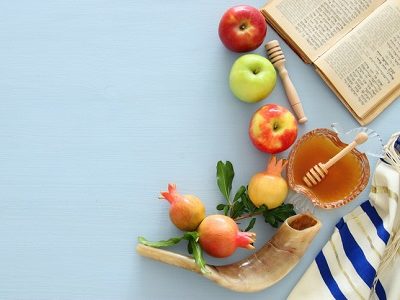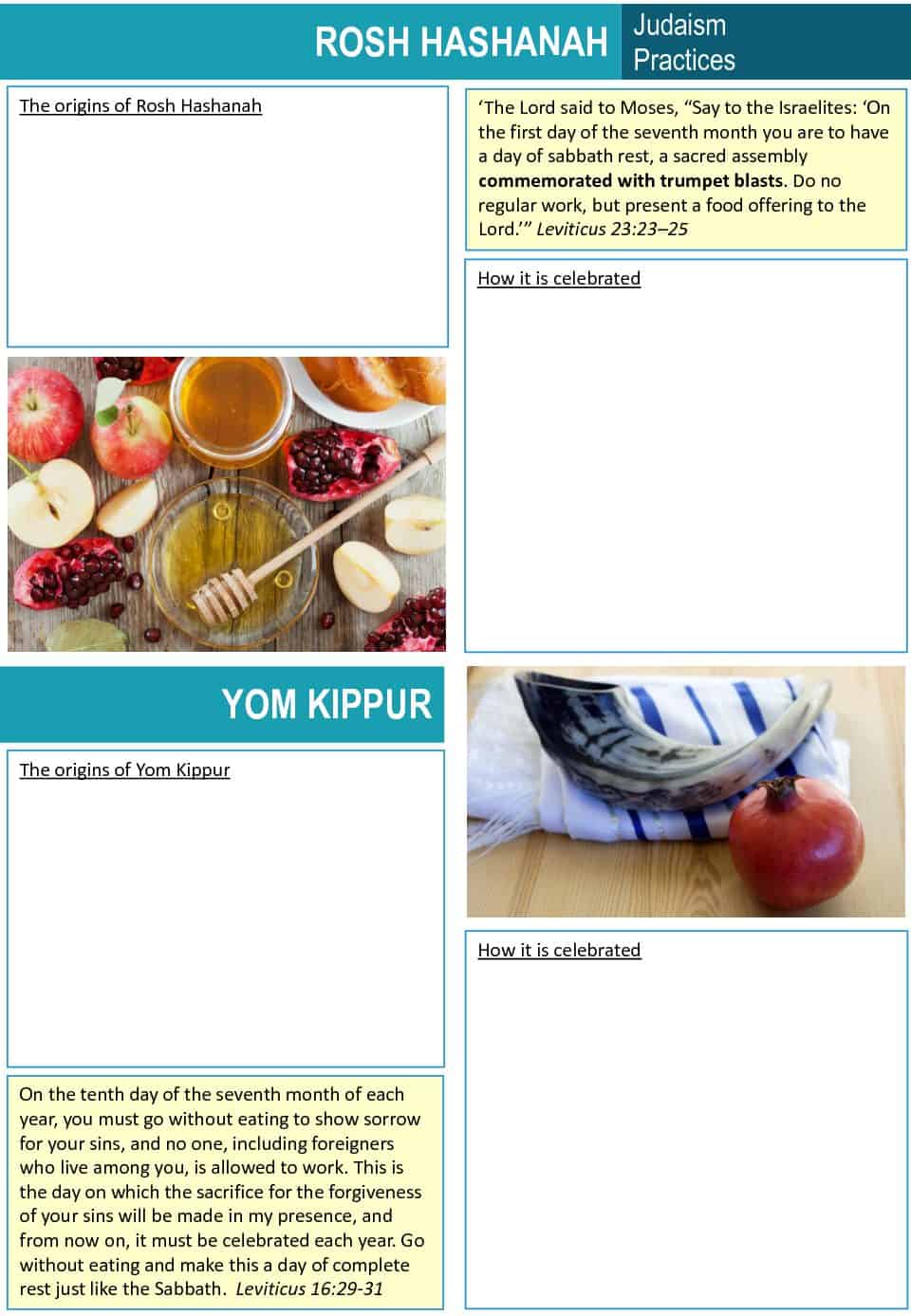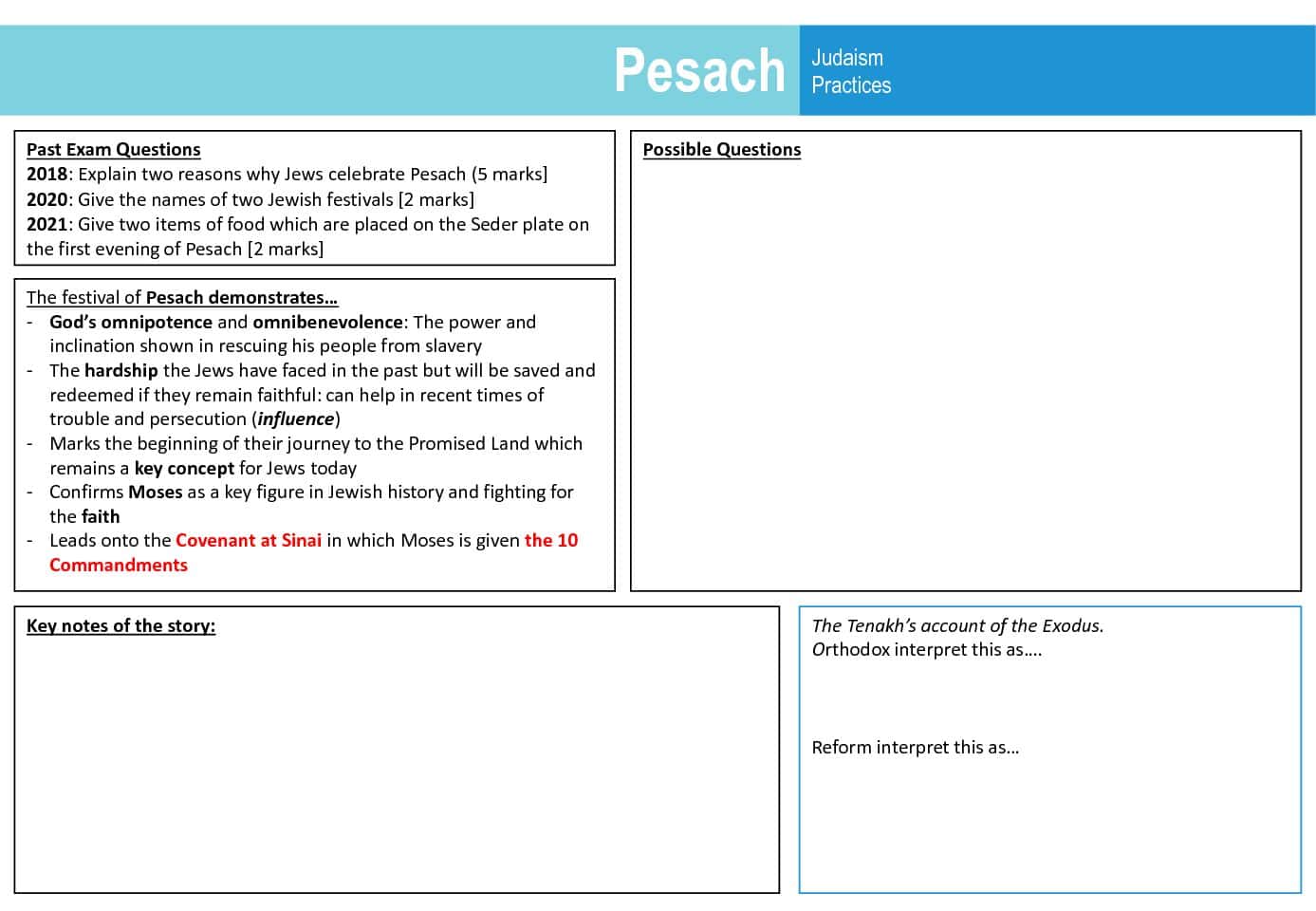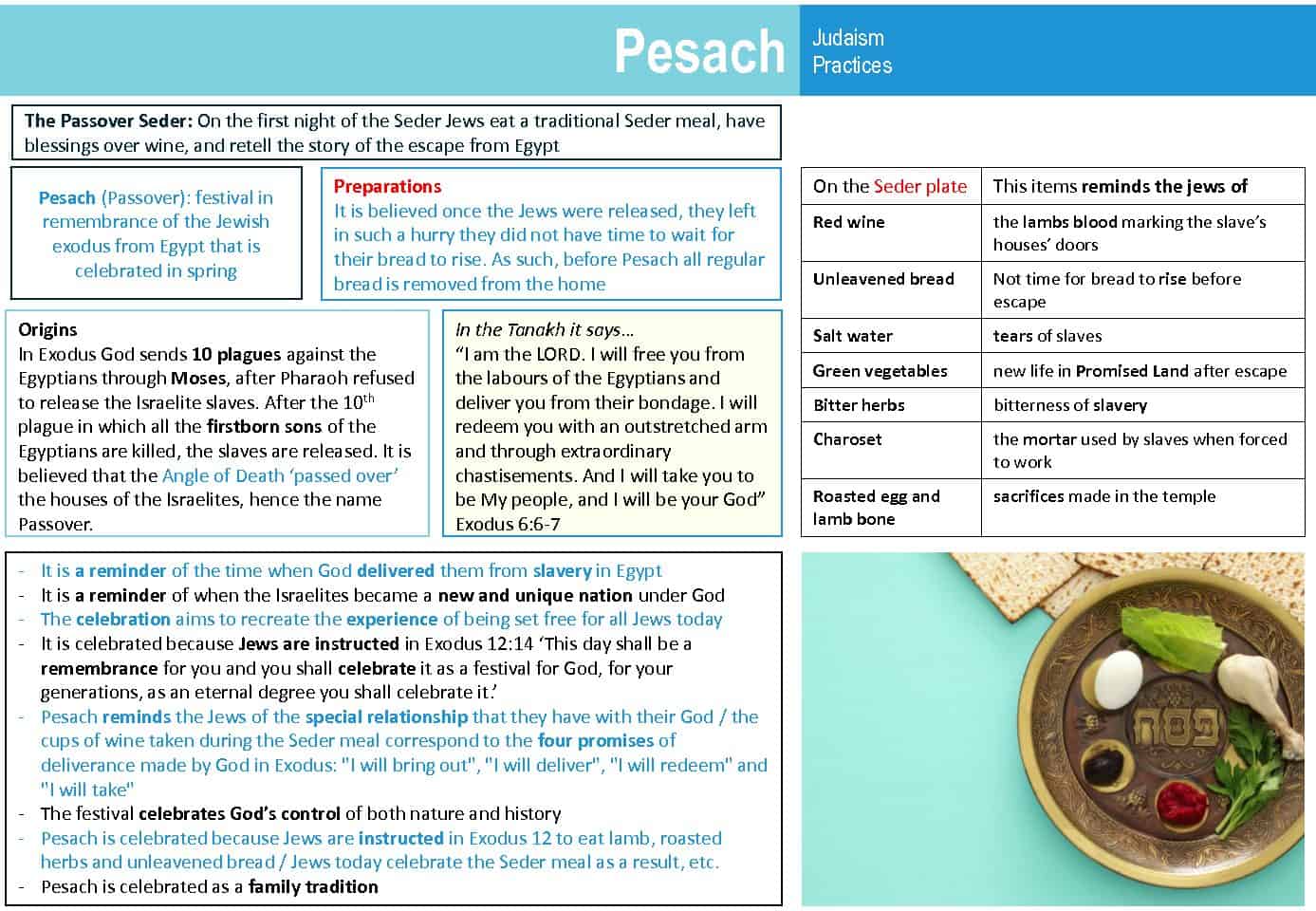Judaism Practices
Festivals
Festivals and their importance for Jews in Great Britain today, including the origins and meaning
- Rosh Hashanah and Yom Kippur
- Pesach
Rosh Hashanah & Yom Kippur
Give the names of two Jewish Festivals. (2)
2020
Rosh Hashanah / Yom Kippur / Sukkot / Pesach / Shavuot / Hannukah / Purim / Shabbat
Explain two religious activities that take place during the festival of Yom Kippur. (5)
2021
Yom Kippur is the Day of Atonement.
- Observe day (25 hours) of fasting as a way of ‘afflicting the soul’ (Numbers 29:7) / wear white as a sign of purity / remain cheerful throughout the day to mark them having reached this time when the Book of Life (Judgement) closes / repent any sins that are unrepented before the Book of Life (Judgement) is sealed by God / realising that God can release all sins / showing thanks that God is loving and merciful / remembering the ancient custom of putting the people’s sins on a goat and driving it into the wilderness / Kaparot ritual.
- Main focus is confession, repentance and reparation so many Jews spend the whole day focused on this.
- Before Yom Kippur begins, a lavish meal is shared / to strengthen Jews before their fast / to make the fast more difficult as a spiritual discipline.
- Yom Kippur starts with the Kol Nidre service / Kol Nidre prayer is chanted (sung) 3 times / asks God to release them from pledges they have made to God that they have not been able to keep.
- No work is done / bathing, wearing leather shoes and sexual intercourse are forbidden.
- Attend synagogue where the theme is confession and repentance / doors of the Ark remain open requiring people to stand / focus on the book of Jonah which shows God to be for all nations and that people can abandon evil ways, return to good ways, accept responsibility and return to God / the community makes a general confession of sins / Yizkor memorial prayers may be said / blast on the shofar shows the end of the festival and the fast, etc.
Sources of authority might include:
‘You shall practise self denial; and you shall do no manner of work … For on this day, atonement shall be made for you to cleanse you of all your sins; you shall be clean before the Lord. It shall be a Sabbath of complete rest for you, and you should practise self-denial’ (Leviticus 16:29-31).
‘You must deny yourself and do no work’ (Numbers 29:7).
‘For Jews, Yom Kippur is more important than Rosh Hashanah.’ (12)
2022
Arguments in support
- Judgement is finalised on this day so it is the last chance for repentance / Yom Kippur is known as the Day of Atonement / is the holiest day in the Jewish year / it is considered to be very important that repentance and atonement are made / ‘atonement shall be made for you to cleanse you of all your sins’ (Tenakh) / God’s judgement on this day is final / last chance for repentance / gates of repentance / Book of Life is closed.
- Spending much of Yom Kippur in the synagogue emphasises its importance / links to God / asking God for forgiveness / helps to restore the individual’s relationship with God / general confession as a community of Jews / service gives a final chance to confess their sins before the doors of the Ark are closed / symbolises that God’s judgement is sealed.
- On this day, God’s forgiveness is given and the individual’s relationship with God is restored.
- Wearing white to symbolise purity / fasting / not bathing, wearing leather shoes or having sex / during Yom Kippur emphasise the importance of the festival.
- The belief that Rosh Hashanah is preparation for the more important festival of Yom Kippur makes Yom Kippur more important.
- ‘You shall practise self-denial…for on this day atonement shall be made for you to cleanse you of all your sins; you shall be clean before the Lord…it is a law for all time.’ (Leviticus 16:29-31), etc.
Arguments in support of other views
- Rosh Hashanah is the start of the Jewish new year / and the first day of a period of reflection and repentance for a ten day period / which leads up to Yom Kippur / although no actual prayers for repentance take place on Rosh Hashanah and mention of sin and forgiveness are not part of Rosh Hashanah prayers or synagogue services / it is essential preparation for Yom Kippur / without Rosh Hashanah, Yom Kippur would be meaningless / makes them of equal importance.
- Rosh Hashanah begins ten days of repentance during which relationships between people are repaired / God opens the Book of Life which is closed on Yom Kippur.
- Rosh Hashanah celebrates / remembers God’s creation of the world / the anniversary of God creating humans / without which nothing would exist, including Yom Kippur.
- The mitzvah of the Shofar singles out the importance of Rosh Hashanah (Leviticus 23).
- Jews are judged during Rosh Hashanah, its called Yom Hadin- Judgement day / it offers a chance to improve God’s judgement of them by committing to be a better person.
- Rosh Hashanah looks to the future and how the year ahead will be / while Yom Kippur looks back towards the actions of the year gone by.
- Prayers are said in the evening and morning services / a festive meal is shared, including apples
and honey to symbolise the of a sweet new year and a round challah / breadcrumbs that represent sins are symbolically cast into flowing water (tashlich). - Rosh Hashanah introduces 10 days during which relationships between people are repaired / this influences God to do the same in his judgement of them / some Jews see God’s ‘record keeping’ of their sins and repentance as representing the idea that actions have consequences.
- Both festivals have a similar focus on hoping for God’s merciful judgement / they should be considered together rather than separately / so neither can be considered as more important.
- The focus of repentance in Judaism is in the here and now, to achieve a close relationship with God in this life, rather than for the afterlife etc.
Pesach
Explain two reasons why Jews celebrate Pesach. (5)
2018
- Jews celebrate Pesach because it is a reminder of the night when the Angel of Death passed over the homes of the Israelites living in Egypt but killed all the first-born sons and animals of the Egyptians / it is a reminder of the time when God delivered them from slavery in Egypt / it is a reminder of when the Israelites became a new and unique nation under God / the celebration aims to recreate the experience of being set free for all Jews today / it is celebrated because Jews are instructed in Exodus 12:14 ‘This day shall be a remembrance for you and you shall celebrate it as a festival for God, for your generations, as an eternal degree you shall celebrate it.’
- Pesach reminds the Jews of the special relationship that they have with their God / the cups of wine taken during the Seder meal correspond to the four promises of deliverance made by God in Exodus: “I will bring out”, “I will deliver”, “I will redeem” and “I will take” / the festival celebrates God’s control of both nature and history
- Pesach is celebrated because Jews are instructed in Exodus 12 to eat lamb, roasted herbs and unleavened bread / Jews today celebrate the Seder meal as a result, etc.
- Pesach is celebrated as a family tradition
Teachings may include – the book of Exodus, Haggadah, phrases such as the land of milk and honey, ‘and they embittered their lives’, ‘and they cried out to God’ and any description of the Ten Plagues, ‘with a mighty hand and an outstretched arm’ etc
N.B. Credit relevant references to specific items on the Seder plate, and textual references in relation to these items.
Focus should be on why rather than how.
Explain two ways in which the Bar Mitzvah ceremony is important for Jews. (5)
2020
- Ceremony represents the start of a boy taking full responsibility for his own religious education and development / the boy will have had to prepare thoroughly for his Bar Mitzvah / he will have studied the Torah in preparation for reading out loud in the synagogue / he will have spent many hours learning how to read and recite Hebrew / he will have prepared a speech on a theme in the
Torah / and may have also developed a community project / this will have helped him to understand that he is a scholar of the Torah and that this will continue into his adult life / and that he has responsibilities to the wider Jewish community. - Following the ceremony, he will now be able to show full and proper respect when praying / as he will be able to correctly wear the tallit and tefillin / Deuteronomy 6:8 ‘You shall bind them as a sign upon your hand, and they shall be a reminder between your eyes’.
- Completion of the ceremony provides another person who is now eligible to make up a minyan / when a minyan meets, Shekhinah is present / minyan required for specific acts of worship, eg funeral / means there is another person who can read the Torah in the synagogue during worship.
- The ceremony celebrates the link in an unbroken chain of thousands of years of Jewish tradition / the boy is joining this tradition to claim his own Jewish identity and show personal desire for links to whole of Judaism.
- The ceremony is a reminder of freedom to live as a practising Jew / reminder of all those denied this privilege / reminder of being one of God’s chosen people.
- Ceremony involves whole community / community is very important in Judaism / becoming Bar Mitzvah is an extension of that sense of community / initiation to full community / now seen as one of the adults.
- Important day for whole family / extended family attend even from far away / as well as public acknowledgement and celebration within the community, etc.
Resources
Videos










